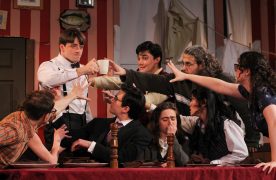The pope has spoken, and he may be speaking too much. Pope Francis spoke to the public and urged world leaders to improve conditions for inmates and abolish capital punishment at Sunday’s gathering in St. Peter’s Square, NPR reported.
The pope said, “All Christians and people of goodwill are called today to work not only for the abolition of the death penalty, but also in order to improve prison conditions, in respect for human dignity of persons deprived of liberty.”
The pope also urged Catholic politicians to use their influence to ensure “no convicted inmate is executed during the church’s Holy Year of Mercy, which ends on Nov. 20,” NPR reported.
At Sunday’s gathering, Pope Francis also voiced support for an international conference against the death penalty. This news comes after Pope Francis approved the use of contraception in the fight against the Zika virus.
Advocating political stances is nothing new for a pope. But Pope Francis specifically asked the politicians of the world to do the Catholic Church’s bidding.
The pope is a religious figure, and he should stay that way. He is not a world leader, but an opinion leader. Though he has little real political authority, his words have the power to influence policies made by politicians. That’s not good.
Religious institutions shouldn’t play a part in politics. However, reality shows the contrary. The pope has even spoken at the White House and has even commented on at least one U.S. presidential candidate. There’s no way religion and politics are two distinctly separate spheres. But they should be.
The pope should voice his opinions. He’s the Catholic Church’s top opinion leader. If he doesn’t voice the church’s positions on some social issues, Catholics all over the world would be spiritually lost.
But more often than not, the values the pope speaks about morph into definite stances on political issues. People vote for what those values align with, and religion often influences them.
The problem, then, is not in the pope’s outspokenness on certain issues. He’s just doing his job. The problem arises when politicians act on the pope’s explicit words and craft Christian policies for a nation of different religions. Religion must be separate from politics if a nation made up of different faiths is to succeed.
Politicians must back up their acts with an argument unrelated to religion. The thought process shouldn’t be, “This is beneficial to all Christians,” but, “This is good for all Americans.”
It’s weird to stop using the death penalty solely because the pope said to or to stop hating gay people for the same reason. These are issues for which people need to reach conclusions on their own. Believing is not simply following orders.
Even though the United States was founded as a refuge for those persecuted for their religious beliefs, it’s somehow morphed into a bastion of Christianity. Christian values are heavily cited in the lawmaking process, and every presidential candidate is essentially required to speak on his or her religion, as if to reassure the American public that the next president will be a person of strong faith.
Obviously, politicians can function without taking orders from the pope. When former President John F. Kennedy was elected president, some Americans were worried his Catholic faith would lead him to take orders from the pope while in office. But that didn’t happen. Kennedy was able to separate the religious from the political, and he gave the pope’s words their own power privately.
Long ago, the pope had near absolute political power. But since those days, people have become more tolerant of other religions and have embraced democracy, which cannot exist purely in a world where the pope has a political voice. The Catholic institution is politicized as it is and can’t intersect with another political system.
We doubt that the pope’s words would be received so favorably if he had been voicing the same conservative opinions as other popes before him. In a time when strict religion seems to be on the decline, Pope Francis is trying to shape Catholic beliefs in a manner that reflects society.
But the definition of a good person should come from outside of religion. The pope can talk all he wants, but following his every word does not make you an upstanding person.















“The pope is a religious figure, and he should stay that way. He is not a world leader, but an opinion leader.” Silly remark. The Pope leads 1.2 billion Catholics globally and is the head of state of Vatican City. (The Vatican is perhaps one of the oldest governing bodies in the world, lasting 2000+ years). The Pope is most certainly a world leader (but there seem to be many people, including actors and actresses, who one might consider world leaders these days…) I think your beef is with politicians and governments who tend to be swayed by the Pope’s opinions. So saying the Pope “may be speaking too much” is a bit misplaced. But it’s good to see you are trying to focus on some important issues….